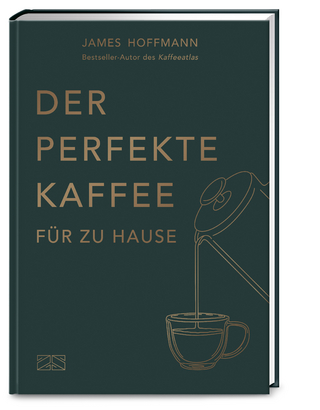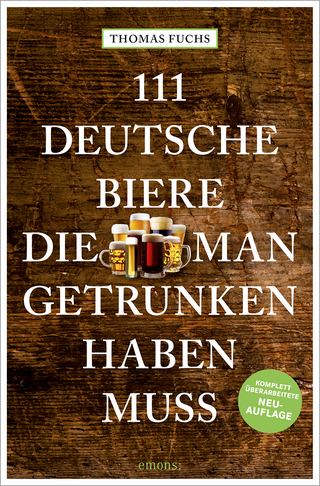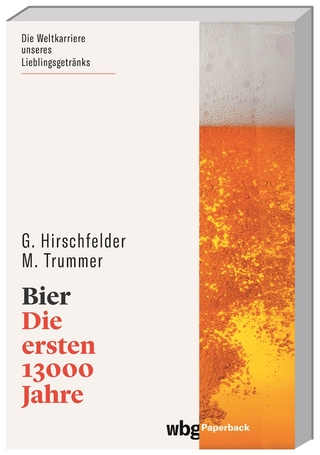
Secrets of Wine
Infinite Ideas Limited (Verlag)
978-1-904902-08-9 (ISBN)
- Titel ist leider vergriffen;
keine Neuauflage - Artikel merken
"A few years ago I applied for a job on a wine magazine. 'Tell us about yourself,' said my prospective boss, 'Well, I don't really know very much about wine.' I was offered the job anyway and I've spent almost every day since asking questions about wine. Asking questions is the only way to understand wine - and some of the answers will surprise you, not least that wine is far simpler to understand than you think. Forget the wine snobbery, the "has a bouquet reminiscent of elderberries drying on a nun's bicycle seat" pretentious language that seems to dominate the world of wine. What I offer is an insiders' guide to the real world of wine, the kind of information that a good sommelier will provide you with. Cheers!" Giles Klime. "Secrets of wine" is about the art of free-thinking drinking. Wine over the past twenty or so years has become a massive industry full of spin hype and mega-marketing. Here Giles Kime cuts through the crap, and gives you expert advice on choosing wine that works for you and your friends. So, if you always go for the Chateau Neuf because it's reassuringly expensive, "Secrets of wine" is for you!
Find out how to: Get past the label and the hype; Power-up your palate; Get the best out of tasting and glasses; Distinguish colour and character; Wines that taste of the weather; Discover which foods really go with which wine; Keep wine properly saved and know when to drink it. With the 52 Brilliant Ideas series readers can enhance their existing skills with negligible investment of time or money and will substantially improve their performance over the course of a year. Each of the 52 chapters tackles a single aspect of the subject in an entertaining and lively way. At the end of each chapter is a "how did it go?" feature which allows readers to reflect on the lesson in a classic experimental learning pattern. The tone of each book is personal and informal; readers will feel as though they are having a one-to-one with their favourite coach.
From 1992 to 1995 Giles Kimes was editor of Decanter Magazine, one of the world's leading specialist wine titles. From 2001 - 2004 he wrote the wine column for The Sunday Telegraph, for which he now contributes wine recommendations. He has also reviewed wine books for the Times Literary supplement. His day job is Deputy Editor of Homes & Gardens.
Introduction 1. Never mind the bollocks If you open a bottle wine burdened with preconceived ideas based on its label, its price and myths spun by the wine trade, it's time to learn the art of free-thinking drinking. 2. The agony of choice When Isaiah Berlin famously moaned about 'the agony of choice' he might have just visited a wine merchant. But, however wide the choice of wines on sale, only a relatively small number need initially concern the free-thinking drinker. 3. The comfort of strangers The quickest and most effective way to dispose of oenological baggage is to taste wines anonymously. 4. Sweet dreams. Detecting sweetness in a wine shouldn't dampen your ardour - particularly when it's balanced with a good dose of mouth-watering acidity. 5. Put your palate through its paces. Understanding a wine's flavour is a much more complex art than you might imagine. But rest assured: with plenty of time, practise makes perfect. 6. Scents and sensibilities A decent glass of wine should offer your olfactory system the most enjoyable aromatherapy treatments your palate has ever had. 7. Glass act In order to fully appreciate the smell of a wine it is essential that you have the right glass. But don't allow yourself to be confused - or conned - by anyone who tries to sell you a different glass for every conceivable type of wine. 8. Understanding Chardonnay The Chardonnay grape produces far more than just one wine. Depending on where it is grown and how it is handled, it will produce a vast array of styles - some dull, some delicious. 9. Whites with attitude The more obscure the grape, the more exciting the range of flavours. Learn to love the exotic pleasures of offbeat white grapes. 10. Grape expectations Mastering the art of telling one grape from another is the easy bit. But, such is the intervention that goes on during the winemaking process, the really knotty question is whether grapes truly matter. 11. What winemakers do If only wine consisted of nothing more than the fermented juice of grapes! In fact, there's a great deal of intervention in the winery, some good, some rather distasteful. 12. Waiter, there's some oak in my glass Of all the flavours in wine, oak is the most easily identified. Here's a guide to spotting it - and to using such disparaging putdowns as 'mouth-puckeringly oaky' with confidence. 13. Come rain or shine One of the reasons that wine has a huge range of different flavours and aromas is that grapes are enormously sensitive to the climate they are grown in. 14. Growing old gracefully Do all wines improve with age? If not, which wines do? Take your palate on a journey into the past. 15. Words don't come easy Though one can feel self-conscious when talking about wine, this is an essential part of deepening your understanding. Learn to do it with confidence - and without sounding like a wine bore. 16. The heat is on Temperature plays a key role in the way that a wine expresses itself. Instead of adhering to prescriptive guidelines, chuck away the rulebook and discover what works best for you. 17. The reign of terroir Is the idea of terroir nothing more than a figment of French winemakers' imagination - a notion used as an excuse for badly made, earthy wines? 18. In the mix Making wines from just one type of grape might have made wine easier to understand, but many of the world's greatest wines are made from a blend of different grapes. It's time to decide whether you prefer your grapes straight or mixed. 19. Cork talk Once you know how, spotting corked wine is easy - but the fact is that you shouldn't have to. 20. Counting on Cabernet Cabernet Sauvignon has been used to make some of the world's most expensive, long-lived wines - and also some of the most disappointing. Find the best examples and you could be in for a lifelong love affair. 21. Bordeaux, Burgundy and Champagne How to enjoy classic French wines - and avoid those that are a triumph of flummery over flavour. 22. The beautiful south A hitchhiker's guide to the deep, inky reds and three-dimensional whites of southern France. 23. Lovely bubbly? Although many people regard fizzy wine as a treat there's no doubt that bubbles can mask some pretty tawdry, hangover-inducing wines 24. Spanish highs Don't ignore Spanish wines just because their labels seem more confusing than those from the New World. Spain produces some of the world's most seductive wines, and they cost a fraction of the price of comparable wines from more fashionable regions. 25. A user's guide to sommeliers So you find the people who serve wine in restaurants patronising and unnecessary? You clearly haven't read the operating manual... 26. The wizards of Oz Do Australian winemakers make wines that are fresh, vibrant and fruity or dull, boring and a triumph of marketing? It's time to make up your mind in the great Australian wine debate. 27. Fantasy island Thirty years ago the idea that New Zealand would one day become a source of some of the world's best-quality white wines would have been treated with a loud guffaw among wine buffs. 28. California dreaming The vineyards near America's West Coast are among the most beautiful in the world. Yet does the relentless pursuit of technical perfection in Californian wineries create wines that are the stuff of dreams or are they, er, a little bland? 29. The Italian renaissance In the 80s the Italians churned out some pretty ordinary wine - and we drank it in huge quantities. But twenty years later producers have learnt their leson and are producing wines that offer light relief from the predictable flavours of Ozzie Chardonnay. 30. Sherry baby A sickly old-fashioned drink fit only for the plughole, or one of the world's best-value and underrated wines? Focus on the best examples and you might soon have an opinion. 31. Que Syrah, Syrah Syrah - the classic red grape of the Rhone Valley - has been reinvented by Australian winemakers with such success that they have given birth to a style of wine that is all their own. They have even given it their own name. 32. The merchants of menace A good wine merchant is as essential as a bottle opener. Not only are the best hugely knowledgeable; they also sell wines that you are unlikely to find in a supermarket. 33. The secret of a happy marriage The art of matching food and wine has spawned countless rules and regulations dreamt up by obsessive foodies. However, the key to a sensual, satisfying relationship is an open mind. 34. Money talks The fact that a perfectly decent bottle of wine costs very little while a slightly better one can cost a hundred times more begs the question of whether there's any real correlation between price and flavour. 35. On doctor's orders? The wine industry might try to promote wine as an intrinsic part of a healthy diet, but there is no doubt that the effects of heavy drinking are calamitous. Learn to distinguish the myths from the realities. 36. Eastern promise In the eighteenth century Eastern Europe was home to some of the world's greatest wines. Yet 300 years on it labours under a reputation for producing rather indifferent wine. Will its star ever rise again? 37. Touch me in the morning Is Port little more than a guaranteed path to a hangover? Or is it one of the world's most artfully made wines. You decide. 38. The brave New World Wine buffs use the term 'New World' as though Christopher Columbus had only just discovered that there was human life beyond the Atlantic. But outdated or not it is a convenient description to refer to a revolutionary new approach to wine. 39. All fine and dandy What makes a wine worthy of the description 'fine'? A fancy label (and price to match) or a delicious flavour and aroma? As a free-thinking drinker you'll soon discover the answer to this question - and also that fine wines needn't cost the earth. 40. Simply reds Cabernet Sauvignon, Merlot, Shiraz and Pinot Noir might have achieved world domination, but once you've mastered them get your head round the flavours that Malbec, Cabernet Franc, Pinotage, Zinfandel and Carmenere have to offer. 41. Hot off the marks Australia, New Zealand and California might have had a head start in the race to create fabulous, world-class wines but South Africa and Chile aren't far behind. 42. The lure of the Loire Of all the French wine regions that have received a serious challenge from New World winemakers it is the Loire Valley that has been most guilty of complacency. 43. A river runs through it. The vineyards that stretch down to the Rhone produce some of the world's most delicious reds - and also one of the most legendary whites. But the Rhone's greatest success has been to remain true to its winemaking tradition. 44. The great Burgundy test In Burgundy, the Pinot Noir and Chardonnay grapes are ingredients of some of the world's most revered wines. But have winemakers elsewhere had more success in using them to create everyday wines? 45. The great white hope The Semillon grape is one of the wine world's best kept secrets and makes some of the world's most alluring wines. Allow its off-beat flavours and aromas to enhance your gastronomic life. 46. Break for the Bordeaux Bordeaux might be the most complex, confusing wine region in the world, but persevere and you will be rewarded with the most magnificent, subtle wines known to humankind. 47. Many happy returns? For some wine buffs, buying wine and selling it a few years later at a profit is a crafty way of helping to fund their drinking habits. Well, that's the theory anyway... 48. Beyond Liebfraumilch Most of us have so many negative misconceptions about German wine that only a blind tasting can offer any objectivity. But first you must seek some professional help... 49. Local heroes Some of the best wines have an extra dimension: as well as being delicious they also express the winemaking tradition of the area where they were made. And the best needn't cost the earth. 50. Keeping your palate on its toes Even when you're focusing on a limited number of grape varieties and styles, it's useful to venture occasionally into uncharted territory. 51. Avoiding the revenge of Bacchus Hangovers are the scourge of every enthusiastic drinker. But because there's no such thing as a hangover cure the most sensible approach is avoidance. 52. Have you achieved vinous nirvana? Simply following my advice and trying the Taste Tests won't guarantee that you'll become a free-thinking drinker in a flash. But if you persist you'll be handsomely rewarded with a lifetime of pleasure. The End
| Erscheint lt. Verlag | 26.4.2005 |
|---|---|
| Reihe/Serie | 52 brilliant ideas |
| Zusatzinfo | Illustrations |
| Verlagsort | Durrington |
| Sprache | englisch |
| Maße | 171 x 210 mm |
| Themenwelt | Sachbuch/Ratgeber ► Essen / Trinken ► Getränke |
| ISBN-10 | 1-904902-08-1 / 1904902081 |
| ISBN-13 | 978-1-904902-08-9 / 9781904902089 |
| Zustand | Neuware |
| Haben Sie eine Frage zum Produkt? |
aus dem Bereich


